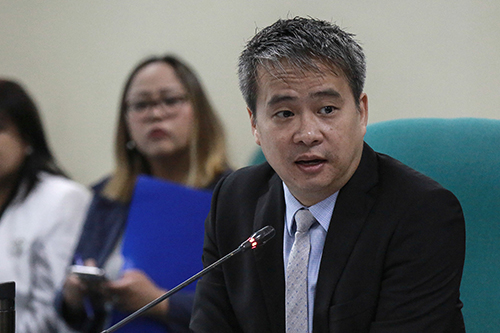Villanueva reminds gov't: WFH law meant to address worsening traffic in Metro Manila
The law that encourages employers to allow telecommuting or the so-called “work from home” arrangements was meant to actually address the worsening traffic situation in the Philippines.

Sen. Joel Villanueva (Senate PRIB Photo)
Senate Majority Leader Joel Villanueva pointed this out in response to the Private Sector Advisory Council’s (PSAC) position that “work from home” arrangements is only good during the Covid-19 pandemic.
“When we authored and sponsored Telecommuting or the Work-from-Home Law in 2019, our intention was to address the worsening traffic situation, especially in the metropolitan areas,” Villanueva said, RA 11165 or An Act Institutionalizing Telecommuting as an Alternative Work Arrangement for Employees in the Private Sector.
“But when the COVID-19 pandemic hit the whole world, we saw the full implementation of the law and how productivity was not halted because of the alternative working arrangements provided,” the senator stressed.
“In fact, e-commerce and digital transactions grew by 20% from 2021 to 2022, even while most people are still working from home,” he pointed out.
And while the pandemic may be over, “our traffic situation has gotten more intolerable,” Villanueva lamented.
The Senate majority leader cited a 2018 Japan International Cooperation Agency (JICA) study, that the Philippines lost P3.5-billion a day due to the heavy traffic in Metro Manila.
In December 2022, in a project report for the Comprehensive Traffic Management Plan, JICA also noted that "transportation costs of road users, comprising vehicle operating cost and travel time cost, is now at P4.9-billion per day in Metro Manila, which will increase to P9.4-billion a day by 2027 if nothing is done."
Villanueva further noted that while inflation has slowed down to 4.7 percent in July 2023 from 5.4 percent in June 2023, the average inflation rate from January to July 2023 is still at 6.8 percent.
“This still puts financial constraints on our commuters, especially our minimum wage earners receiving a salary of P610 per day in the National Capital Region (NCR),” he said.
The WFH Law, he said, was also instrumental for the IT-BPO sector wherein 23,000 new jobs were created in 2020 and 100,000 in 2021 with revenues increasing by around 12 percent in 2021, reaching a total of $28.8-billion.
“We filed Senate Bill No. 135 which seeks to allow alternative work arrangements for companies registered with the Investment Promotion Agencies,” he stressed.
“WFH and other alternative work setup are here to stay and seen to further improve productivity, ease traffic burden, improve work-life balance, reduce our workers' expenses and contribute to the overall health of the economy,” he reiterated.
In a televised briefing, SAC Lead for Jobs and Go Negosyo founder Jose Ma. “Joey” Concepcion III employees should be encouraged to return to the office as remote work options cut down consumption and slows down the economy.
Concepcion said there would be very weak consumer spending if there is no mobility and that could lead to a lower economic growth for the Philippines.